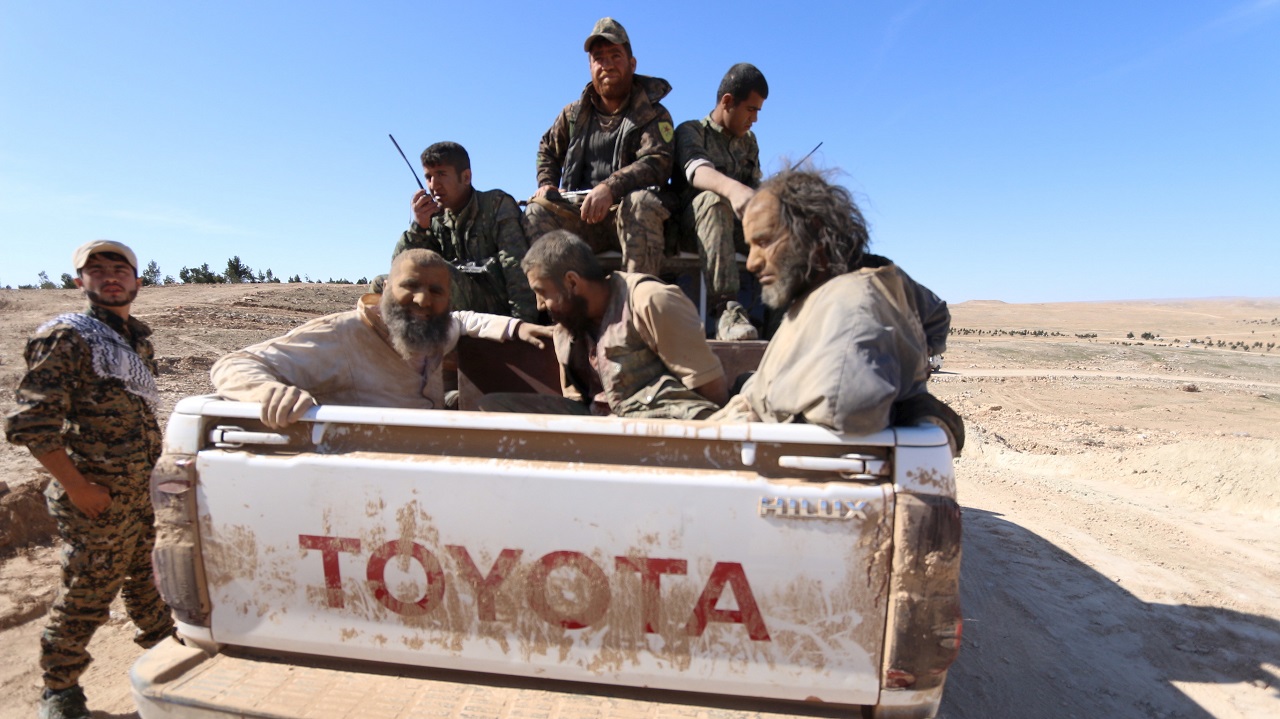In a dimly lit room the men sit on rows of bunk beds, their legs crossed or extended. Some smoke or read. Others rock rhythmically to and fro, mumbling prayers under their breath. Bright pink blankets stand in stark contrast with the grim atmosphere. A pale, thin man with wire-rimmed spectacles and a wispy beard stares daggers at a reporter who is allowed to peer briefly through a grilled window built into the cell’s iron door. He’s from Dagestan and, like the rest of his fellow prisoners at the Derik Central Prison for Terrorists in northeastern Syria, he was a fighter for the Islamic State.
Al-Monitor is the first Western media outlet to have been granted access to the maximum security detention center. It is run by the Syrian Kurdish administration, which controls a swath of northeastern Syrian territory the size of England that is protected by the US-led coalition battling IS together with the Kurds.
“This is the main detention center for captive fighters. The most dangerous terrorists are here,” Murad Ser, who has run the facility since 2014, told Al-Monitor on a recent afternoon. The converted warehouse currently houses around 400 IS combatants. “There are Canadians, Europeans, Chinese, Saudi Arabians, Tunisians, Libyans, Russians, Turks, Moroccans and many other nationalities,” Ser said, drawing an imaginary globe. Two hundred security guards watch over them.
The issue of what to do with captured foreign fighters is an increasingly pressing one as Western governments refuse to take their nationals back. The Syrian Kurdish administration says it cannot cope on its own and is demanding that they be either repatriated to be prosecuted in their home countries or tried by an international tribunal in a northeastern Syrian court.
“Until such time, the international community must provide us with money to care for these people,” Aldar Khalil, a senior official in the Syrian Kurdish administration, told Al-Monitor in an interview in Qamishli. “So far we have not received a penny from anyone,” he said. A US official speaking on condition of strict anonymity because of the sensitive nature of the issue confirmed that no funds had been given by the United States to the Syrian Kurds to care for the IS captives. The cost of just feeding and clothing inmates at the Derik facility is in excess of $20,000 per month, Ser asserted.
The tour of the prison starts in a roomy kitchen. It’s ugly but clean. Any filming or photography inside the prison is strictly forbidden. A giant pot bubbles on a gas stove. Crates full of vegetables sit on the floor. “Tonight’s menu is boiled eggs and potatoes,” said Ali, the in-house cook. “There are exactly 425 eggs in there.” The men are fed three times a day inside their cells. The food is wheeled in on large steel trolleys. But a dining hall will soon be built where inhabitants of each cell will eat in separate shifts. Special-needs detainees such as diabetics are given separate meals. Pulses, rice, soups and salads are daily staples. “Sometimes when they ask for something particular we order it from outside,” the cook explained.
Smokers are given one pack of cigarettes a day. “Everything here is free,” Ser said. A doctor comes in for weekly health checks.
The next stop is a large, empty hall where prison authorities are planning to build five different workshops so that prisoners can spend time productively outside their cells. “We also intend to hold seminars and training programs, but most of these men are already quite educated, you know, like doctors, engineers,” Ser added.
Inmates are allowed to exercise for an hour and a half per day but again only with their own cellmates. Interaction with other prisoners is strictly forbidden for security reasons. There are three courtyards where they can walk and smoke. Barely legible lines of Arabic are etched on the towering gray walls separating them. One reads, “First we rode the horses.”
“We are aware of their plans to escape but so far they haven’t tried anything. But don’t forget, they are Daesh,” said a counter terrorism official who asked not to be identified by name, using the Arabic acronym for the Islamic State. Torture, ill treatment and verbal abuse of prisoners are strictly forbidden here, he insisted. “We abide by the Geneva Convention.” The Red Cross carries out routine inspections. “In battle these people are the enemy but here they are treated like human beings,” the official said. Tens of thousands of IS wives and children are meanwhile struggling to survive in the squalor of overcrowded outdoor camps while the men bask in the comparative luxury of Derik prison.
It all sounds and looks too good to be true. There are other interrogation centers where IS fighters who either turn themselves in or are captured go through initial screening. It’s hard to believe that conditions there are quite as clement, considering the brutality inflicted by IS on the Kurds.
A cell that was emptied of its residents for Al-Monitor to inspect had 23 bunk beds with stained, wafer-thin sponge mattresses. There was a medium-sized flat screen television attached to the wall. Prisoners quarrel over which channels to watch. They are in either Arabic or Kurdish. “Usually it’s about whether the content is too un-Islamic or not. Otherwise they generally don’t fight,” Ser observed.
Two well-thumbed Qurans with loose pages sit on a shelf alongside a bottle of olive oil-based shampoo and two bars of soap. There’s a small toilet with its own door but no lock. Prisoners can play cards and chess. Some like to sing Islamic nasheeds. When I ask if there is a separate prayer room, Ser responds with an icy “No.” The cell has an air conditioner, as do all the rest, Ser said.
I am allowed to speak with three inmates. “Pick a nationality and we’ll see if they’ll talk.” A Turk, a Tunisian and a Trinidadian who holds Canadian citizenship agree to be interviewed.
Oguzhan Emre, a 46-year-old accountant from Ankara who migrated to the IS “caliphate” together with his wife and five children in 2014, has been held here since December 2017 after turning himself into the YPG-led Syrian Democratic Forces (SDF) in Deir ez-Zor province. He was radicalized by a bookstore owner called Kamil in Ankara’s Sincan neighborhood who died later on in Raqqa. “I don’t remember his last name.” What about the book store? “I can’t remember its name.” Emre came, he claimed, “to lead an Islamic life.” It all sounded “so rosy.” He forced his wife to come. “Otherwise, I was going to take the children and leave. She had to obey.” They crossed in broad daylight by foot from the southern Turkish province of Gaziantep.
There were no Turkish border guards in sight.
He denied participating in the jihadi orgy of head-chopping violence and “regretted coming and starting making plans to flee as soon as I arrived.” But “it was like being trapped in a spider’s web. The more you flapped your wings to get out, the more you got enmeshed.”
Ser later tells me that all of the inmates deny involvement in the violence. “They are lying. Every male who joins Daesh is trained to fight and is sent to the front line.”
Emre earned $250 a month assisting an accountant first in Al Bab then Mayadeen. An armed minder who sits with us throughout the interview briefly steps out. I seize the opportunity to ask him how he is being treated. “In all fairness, God is my witness, they treat me very well. There’s no beating or anything, the food is nice and clean,” he said. “The Red Cross visited me once in my cell.” A 20-year-old from Gaziantep is among his cellmates. His main complaint is that his wife and children, who are being held in the nearby Roj camp, have not been permitted to visit him. Considering how he treated her, perhaps it’s she who refuses to come. Asked if he has a message for her — I was supposed to interview her there in the coming days, but the camp has since been put off limits to journalists — he says “no.”
The Tunisian is next up. I had already interviewed Jamel Ben Moussa last month via Skype for a piece I did on Tunisian jihadis. “Oh, hello Zaman,” he said as if greeting an old friend. He seemed very agitated. “What is going to happen to us? They are sending our brothers to Iraq where they will be executed. We saw it on the television news. This is criminal,” he said. “Will we be next?” Ben Moussa was referring to reports in early March that the SDF had handed over at least 280 IS prisoners, mostly Iraqi nationals, to Iraq. But at least 13 French IS prisoners were alleged to be among the group. “One of them was my friend. He wasn’t French, he just had a residence permit,” Ben Moussa claimed.
The SDF has formally denied the reports. But in late February, Iraqi President Barham Salih announced that Iraq would prosecute the French extremists in accordance with Iraqi law and within the confines of international law, prompting rebukes from Human Rights Watch. “Detainees are subject to unfair trials that could still end in the death penalty,” the New York-based watchdog said in a statement, adding, “Trials of IS suspects fail to meet even the most basic markers of due process” and that they can be a short as “five minutes.”
“What will our families do, our children in the camps? Our sons, do you think they will accept that their fathers are murdered like this? They will seek revenge. I am warning France, Europe, a new war will start,” he said. I glance at the minder to gauge his reaction. He seems unfazed. I turn the subject to Ben Moussa’s two wives, a Syrian and a Swede. He’s had a pair of children with each. “Ah,” he said, “the difficulty with polygamy in Islam is that you are supposed to treat the wives equally. But you know there is always a favorite. I love the Swedish one more. I want to go back with her to Tunisia.” A smile flickers on the the minder’s lips.
Safraz Ali, a 39-year-old dual Trinidadian and Canadian citizen, says he was recruited by fellow Trinidadians and joined the Islamic State in 2015 “to help the Syrian people.” He explained, “I didn’t seek out [IS execution] videos. I was against all of that. They sent me to Iraq to fight. I refused and fled to Syria on a bus. I had trauma training. I would go out after coalition bombings and pick up wounded children and take them to the hospital.” He ended up in Al Bab, where “people were so kind they would give you the shirts off their backs.” After Turkish troops captured the town in 2016 he moved on to Raqqa. “People were much harsher, crueler there.”
Ali is rail thin. His eyes are glazed. He seems weak. “I have terminal Crohn’s disease,” he said. “They don’t have proper medicine here. I have rectal bleeding, dizzy spells and blurry vision.” He clutches an inhaler in his hand. “Asthma,” he explains. He says he is scared but far more concerned for his wife. It emerges that he is married to Kimberley Gwen Polman, 46, a dual US and Canadian citizen he met in Raqqa who was profiled by the New York Times.
They were married in 2016 and made plans to flee together soon after. They were in touch with Polman’s family and a Canadian official who handled such cases, he claimed. The pair was ratted out by spies and briefly imprisoned in Raqqa and continued to plot their escape once they were freed. “We led the life of fugitives,” he said, describing a harrowing odyssey that took the couple from Raqqa to Mayadeen and then Hajin. They finally turned themselves over to SDF forces a little over a month ago. “We desperately wanted to have children. Kimberley had five miscarriages,” he said. “I spend all my time thinking about my wife”.
I feel sorry for him and offer reasons he might have joined the Islamic State. His father, a Christian, and his mother, a Muslim, were divorced. Had he had a rough childhood? His Gandhi-like demeanor evaporates. “You are psychologically profiling me,” he said with a cold, hard look. It’s time to end the conversation. The minder handcuffs Ali and leads him away.
By Amberin Zaman
Al Monitor
Redazione
La redazione di Babilon è composta da giovani giornalisti, analisti e ricercatori attenti alle dinamiche mondiali. Il nostro obiettivo è rendere più comprensibile la geopolitica a tutti i tipi di lettori.
Dall’origine straniera all’icona americana: il fenomeno dello sport negli Usa
14 Mar 2024
Molti sport americani sono accomunati da un aspetto particolarmente curioso: raramente sono davvero nati sul suolo…
Roulette europea, francese o americana? Ecco un approfondimento
22 Set 2023
La roulette è un classico intramontabile dei casinò, amata da milioni di appassionati in tutto il mondo. Una delle…
Conto corrente online: perché è la soluzione migliore per i più giovani
21 Ott 2022
I millennial e i nativi digitali hanno dimostrato di essere una forza in grado di cambiare le carte in tavola nel…
L’intrattenimento online è dei casinò
31 Ago 2022
Il mondo dell’intrattenimento è vasto e ricco di opzioni. Con l’avvento di internet, poi, il settore non fatto altro…




